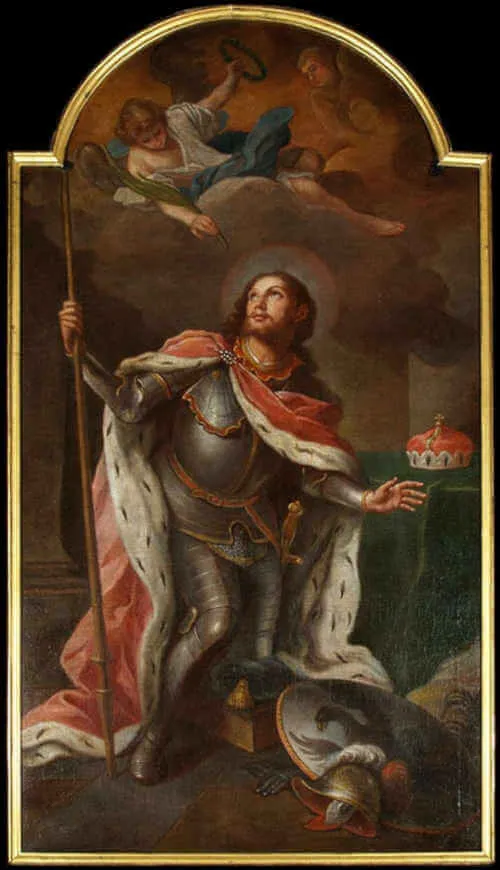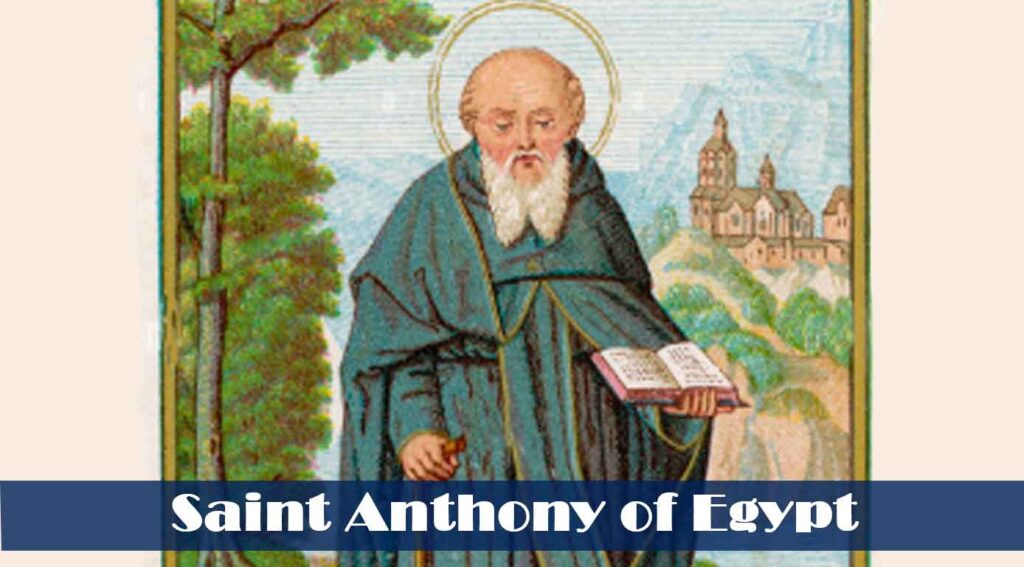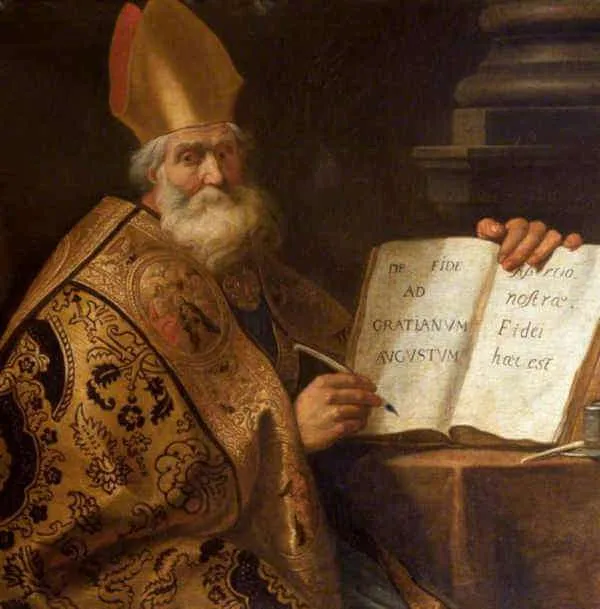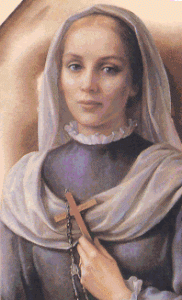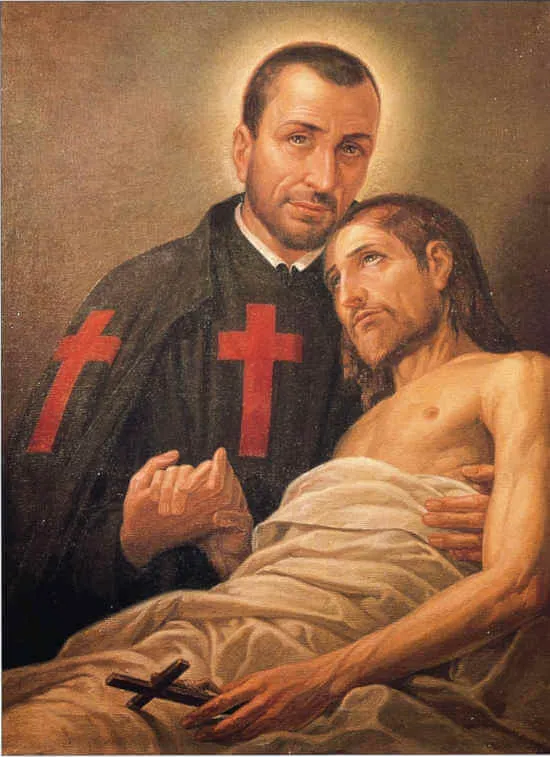c. 907–929; Patron Saint of brewers, Czech Republic, Bohemia, and Slovakia; Pre-Congregation canonization
In the early ninth century, Germanic priests and missionaries began arriving in Great Moravia. These German-speaking priests celebrated the Liturgy exclusively in Latin and struggled to communicate the faith to the Slavic people in their native language. Consequently, Prince Rastislav of Moravia asked the Holy Roman Emperor to send Slavic missionaries. In response, two brothers raised by a Slavic mother, Saints Cyril and Methodius, were sent. To evangelize the Slavs, they created an alphabet for the previously unwritten Slavic language and translated the Latin Scriptures and liturgical texts into written Slavic. Among their converts were Duke Bořivoj I and his wife, Duchess Ludmila. Bořivoj and Ludmila were from neighboring Bohemia. After their baptism in Great Moravia, the couple introduced the Catholic faith to Bohemia. Upon Duke Bořivoj’s death, his son Vratislaus I assumed the role of Duke of Bohemia. Although Vratislaus was Catholic, his wife, Princess Drahomíra, was a pagan from a Slavic tribe. The couple bore at least two children: Wenceslaus and Boleslaus.
Wenceslaus, the saint we honor today, was born in Bohemia, present-day western Czech Republic, during a transitional period. Christian conversions caused tensions with those clinging to traditional pagan and Slavic practices. This division was palpable even within the duke’s household. Duchess Drahomíra, Wenceslaus’ mother, staunchly opposed Christianity, in contrast to her Christian mother-in-law, husband, and sons. Of them all, Ludmila was exceptionally devout and ensured that both her son and grandson, Wenceslaus, were nurtured in the Catholic faith.
Upon Duke Vratislaus’ death, thirteen-year-old Wenceslaus became duke. Given his youth, he needed guidance until he was old enough to govern on his own. His pious grandmother, Ludmila, eagerly undertook this role, persistently encouraging her grandson to bolster the Catholic faith, much to Drahomíra’s chagrin. According to one legend, within a few years of Wenceslaus’ ascension, Drahomíra clandestinely orchestrated the assassination of her mother-in-law, Ludmila, to curtail her influence over Wenceslaus’ religious beliefs. Ludmila was reportedly strangled with a scarf at Tetín Castle. Shortly thereafter, she was canonized, by popular demand of the people.
With Ludmila eliminated, Drahomíra initiated a persecution of the Catholic faith. Catholics were ousted from public positions, churches were shut, and Catholic teachings prohibited. However, this oppression was short-lived. As Wenceslaus matured, Catholic nobles pressed him to exert control and counter his mother’s directives. Heartbroken by his mother’s actions towards his grandmother, Wenceslaus still accorded her respect, but he began to dismantle her anti-Catholic mandates, ultimately banishing her.
Duke Wenceslaus was a profoundly devout Catholic. He yearned for the entirety of Bohemia to embrace Christianity and sought to fulfill this mission by fervent prayers. Diligent in his daily duties, he would frequently devote entire nights to prayer before the Blessed Sacrament. He practiced regular penances, beautified the church, and took joy in preparing bread for the Mass, which he attended daily.
Early Bohemian biographers note an episode in which a neighboring prince aimed to annex Bohemia to obliterate the Catholic faith. Passionate about defending the faith, Wenceslaus led his army to confront the prince. As they clashed, Wenceslaus proposed a duel, with the victor ruling Bohemia. The prince consented, but as they charged, Wenceslaus was shielded by two enormous angels, sending fear into the prince and prompting him to immediately repent.
Throughout his rule, Wenceslaus invited numerous Germanic priests into Bohemia. Although Saints Cyril and Methodius had introduced the liturgy in Slavic, Wenceslaus favored Latin, encouraging its revival and widespread adoption. This preference impacted Bohemia’s liturgical customs, with the Latin rite prevailing over the Eastern rites of the Byzantine Empire.
Wenceslaus’ reign was tragically short. In his twenties, his mother, who preferred power to maternal affection, orchestrated his assassination, designating her younger son as the executioner. Boleslaus invited Wenceslaus to a meal and then slew his own brother. Wenceslaus’ last words are recorded as, “May God forgive you, brother.” Shortly after, Wenceslaus was venerated as a martyr and saint, inspiring biographies and becoming a beacon of virtue for future monarchs. Though Wenceslaus died as a duke, Holy Roman Emperor Otto I posthumously crowned him king, earning him the title “Good King Wenceslas.” Moved by the admiration for Wenceslaus and the miracles attributed to his intercession, his assassin-brother Boleslaus the Cruel sought penance. No records indicate Drahomíra’s remorse.
Saint Wenceslaus epitomizes the supremacy of divine love over earthly allurements. His life, marked by devout prayer, resolute leadership, and boundless compassion—even towards adversaries—attests to the primacy of God’s love over the worldly pursuits of power, prestige, or wealth. He serves as an exemplary figure for both leaders and followers. Allow him to inspire you today so that you will make the Gospel the central focus of your life.
Source: https://mycatholic.life/saints/saints-of-the-liturgical-year/september-28–st-wenceslas-martyr/

